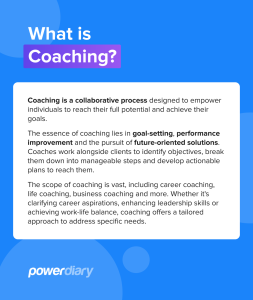Confused about the difference between coaching and counseling? You’re not alone.
The disciplines share some similarities however, they differ in their focus and underlying fundamental practices.
Understanding the differences is vital to providing appropriate support to clients. This article will cover the similarities and differences and explore some nuances that can be a source of confusion.
What is Coaching?
Coaching is a collaborative process designed to empower individuals to reach their full potential and achieve their goals.
The essence of coaching lies in goal-setting, performance improvement and the pursuit of future-oriented solutions. Coaches work alongside clients to identify objectives, break objectives down into manageable steps and develop actionable plans to achieve them.
The scope of coaching is vast, including career coaching, life coaching, business coaching and more. Whether clarifying career aspirations, enhancing leadership skills or achieving work-life balance, coaching offers a tailored approach to address specific needs.
What is Counseling?
Counseling is a therapeutic process to promote mental and emotional well-being, resolve personal challenges and foster self-understanding. Typically, it isn’t bound to action-oriented goals but follows a treatment plan in which the practitioner is largely non-directive.
Counseling usually prioritizes exploring the client’s emotional and interpersonal history by providing a safe space to unpack emotions so that behaviors and reactions can be better understood, resolved and managed.
Counselors employ active listening, empathy and validation techniques to facilitate self-reflection and insight. Through this process, clients gain a deeper understanding of themselves, their relationships and their challenges.
Different types of counseling address unique needs and concerns. For example, couples counseling focuses on improving communication and resolving conflicts within relationships, while trauma therapy helps individuals process and heal from traumatic experiences.
Key Differences Between Coaching and Counseling
Qualifications
Coaches and counselors typically follow distinct educational and licensing paths. While counseling often requires formal education in psychology, social work, or counseling, along with relevant licensure or certification, coaching doesn’t typically require rigid certification compliance.
Of course, coaches may receive training through programs or certifications, but their educational backgrounds and credentials are more variable.
Focus
Coaching adopts a future-oriented approach, concentrating on goal-setting, performance improvement and action-oriented strategies.
In contrast, counseling takes a holistic perspective that isn’t bound to achieving action-based goals. Counseling unpacks past and present experiences and their impact on the individual’s emotions and behaviors.
Client Needs
Understanding when to recommend coaching versus counseling depends on the client’s needs and goals.
For instance, individuals grappling with past trauma, unresolved emotions or mental health concerns may benefit more from counseling, where they can explore deep-seated issues and work toward healing.
Clients seeking guidance in setting career goals, enhancing leadership skills or navigating life transitions may find coaching more beneficial, as it offers practical strategies and accountability to achieve desired outcomes within a set timeline.
Can I Be a Counselor and a Coach?
Absolutely – it’s possible to be both a counselor and a coach, but it’s essential that you navigate the different roles mindfully and ethically.
While the skill sets may overlap to some degree, there are important considerations to keep in mind, particularly concerning business structure, ethical guidelines and professional boundaries.
Business Structure
It’s often advisable to maintain separate practices for counseling and coaching. This helps to avoid potential conflicts of interest and ensures clarity for clients regarding the services being offered.
Some practitioners choose to establish distinct brands, websites and marketing materials for their counseling and coaching services to differentiate between the two.
Ethics
Practitioners providing both counseling and coaching services must navigate potential ethical dilemmas with care and integrity. This may involve seeking supervision, consultation or additional training to ensure ethical practice across both roles.
If you run a practice with multiple counseling or therapy providers, consider creating a team conduct policy to ensure that every practitioner in your practice understands their ethical obligations.
Here are a few guidelines for counselors who also practice as a coach:
Ethics Tip 1: Adhere to Licensing Requirements
Regardless of whether you’re providing therapy or coaching, as a counselor, you’re bound by the laws and regulations governing your profession. This includes obligations such as mandated reporting and maintaining professional boundaries.
If you’re a counselor running a coaching practice, implement informed consent forms to clarify to clients that, although they’re not receiving mental health services, they’re still working with a licensed provider subject to relevant laws.
While referencing your degrees in marketing materials is acceptable, using your mental health license for coaching promotion may not be advisable.
Ethics Tip 2: Avoid Dual Roles
Maintain clear boundaries between your therapy and coaching roles. In other words – avoid providing both services to the same client. If a client expresses interest in coaching while undergoing therapy, consider referring them to a colleague for coaching services.
Conversely, if coaching clients demonstrate a need for therapy, discuss your concerns with them and offer a referral to a qualified therapist.
Ethics Tip 3: Respect Professional Boundaries
When coaching clients also attend therapy with another practitioner, don’t encroach on the other therapist’s domain. Focus solely on the coaching agenda identified by the client and avoid addressing therapeutic issues.
If a conflict arises between coaching and therapeutic goals, prioritize the client’s mental health needs and defer to their therapist.
Ethics Tip 4: Be Clear!
Clearly articulate the services you provide and to whom they’re available. Clarity fosters transparency and ensures clients have a comprehensive understanding of the nature of the support they’re receiving.
By clearly defining boundaries, practitioners empower clients to make informed decisions about their care and provide them with guidance to navigate the complexities of personal development and mental health support.
Ethics Tip 5: Reiterate Informed Consent
It may sound obvious, but informed consent is crucial for ethical practice. As a counselor providing coaching services, you must clearly communicate to coaching clients that, although you’re a licensed provider, you’re not offering them therapy or mental health services.
Highlight your commitment to following state laws and regulations, and clarify any differences in confidentiality between coaching and therapy. Ensure clients understand their rights and responsibilities in the coaching relationship.
Professional Boundaries
Maintain clear boundaries between counseling and coaching roles to ensure the well-being of your clients. Practitioners should communicate openly with clients about the scope and limitations of each service.
Be transparent about your qualifications, expertise and approach. It’s essential to recognize when a client’s needs may require referral to another professional or discipline and to always act in the client’s best interest.
Conclusion
For allied health practitioners seeking to support clients with a range of services, it’s essential to understand the distinctions between coaching and counseling.
Whether you choose to focus on coaching, counseling (or both), it’s imperative that you and your team comply with ethical guidelines.
If you’re looking to streamline your practice management, try Power Diary today. With its user-friendly interface and comprehensive features, Power Diary can help you manage appointments, maintain client records, bill efficiently and stay compliant.
Start your 14-day FREE TRIAL now! No credit card required.







